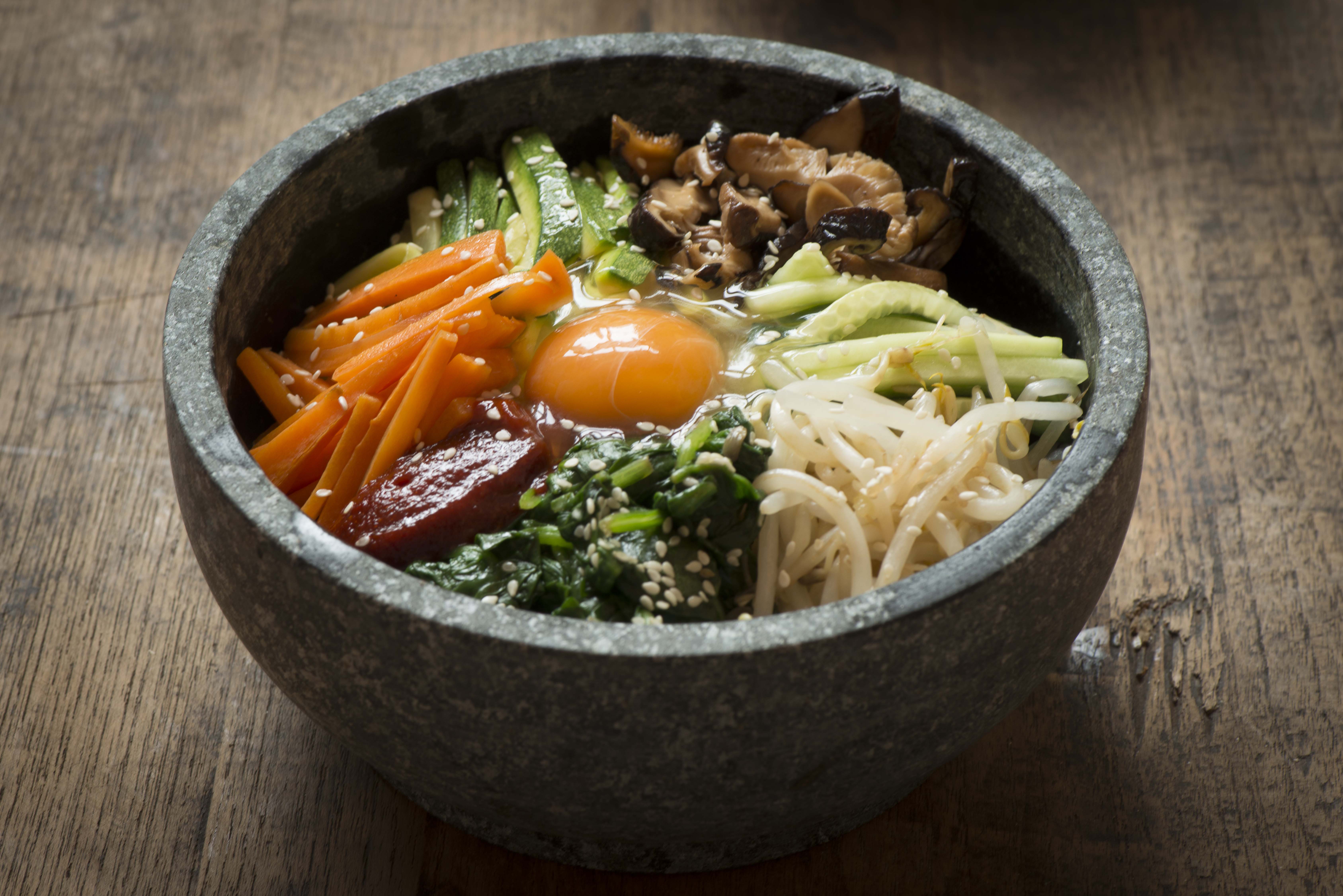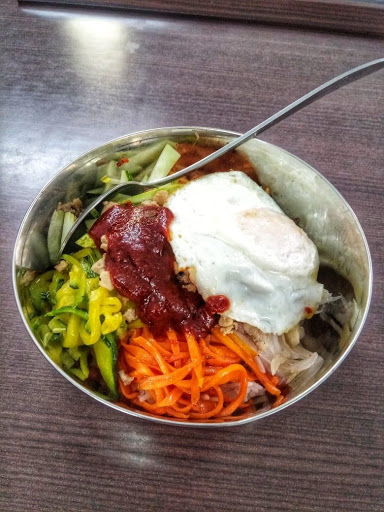|
Jeonju Bibimbap Festival
The Jeonju Bibimbap Festival () is an annual Korean food festival that takes place in the Jeonju Hanok Village in South Korea. It centers on a regional variety of the popular Korean dish bibimbap. The festival has been celebrated since 2007. Overview The festival usually takes place during the month of October every year. It showcases the most iconic dish of the region, bibimbap, and a favorite among tourists. Visitors to the festival can participate in cooking competitions, sample local recipes, and learn how to cook traditional bibimbap. They can also participate in folk games, enjoy concerts, and visit a night market. The festival has been reported to draw 150,000 citizens and tourists. It was cancelled in 2020 due to the COVID-19 pandemic. However, in 2021, the festival was held over four-weeks under the title "World Bibim Week" (""). In 2022, the festival was held offline from the 6th to the 10th of October.{{Cite web , date=2022-09-21 , script-title=ko: ��방곡곡3� ... [...More Info...] [...Related Items...] OR: [Wikipedia] [Google] [Baidu] |
Food Festivals In South Korea
The Food Festivals of South Korea are a series of celebrations that provide insight into Korean cuisine and culture. The cuisine ranges from traditional dishes through to modern interpretations and will often focus on regionally specific recipes and ingredients. They seek to retain Korean cultural identity, raise awareness, and promote local produce, cuisine, and the Korean cuisine, Korean food industry. Over time, some festivals and dishes such as Chimaek have become part of modern Korean culture and were further popularized by Korean drama, K-dramas. Annual Food Festivals Food Festivals in Spring Boseong Green Tea Festival Historically, Boseong County, Boseong has been known for its high-quality green tea. The county boast of one of the best topological and weather conditions for growing green tea. The month of May witnesses an increase in visitors to the areas of Korean Tea Culture Park, especially Boseong County. The annual Boseong Green Tea Festival is held during th ... [...More Info...] [...Related Items...] OR: [Wikipedia] [Google] [Baidu] |
Jeonju Hanok Village
Jeonju Hanok Village () is a village in the city of Jeonju, South Korea, and overlaps with the Pungnam-dong and Gyo-dong neighborhoods. The village contains over 800 Korean traditional houses called Hanok. The village is famous among Koreans and tourists because of its traditional buildings that strongly contrast with the modern city around it. The village was designated as an International Slow city, Slow City in 2010 in recognition of its relaxed pace of life where traditional culture and nature blend harmoniously. The number of visitors to Jeonju Hanok Village has increased sharply since the 2000s. The visitor numbers more than doubled from 2007 to 2014, from 3.17 million to 7.89 million. Excluding Seoul, Jeonju is ranked third among major tourist cities throughout Korea, behind Jeju Province, Jeju and Busan. History The City of Jeonju has played a key role in the long history of Korea. The city was once the capital of the Later Baekje, Hubaekje Kingdom, which was founded by ... [...More Info...] [...Related Items...] OR: [Wikipedia] [Google] [Baidu] |
Bibimbap
Bibimbap * ( ; ), sometimes Romanization of Korean, romanised as bi bim bap or bi bim bop, is a Korean rice dish. The term ''bibim'' means "mixing" and ''Bap (rice dish), bap'' is cooked rice. It is served as a bowl of warm white rice topped with ''namul'' (sautéed or blanched seasoned vegetables) and ''gochujang'' (chili pepper paste). Egg and sliced meat (usually beef) are common additions, stirred together thoroughly just before eating. In South Korea, some cities such as Jeonju, Jinju, and Tongyeong are known for their versions of bibimbap. In 2017 the dish was listed at number 40 on the ''World's 50 most delicious foods'' readers' poll compiled by CNN Travel. Etymologies ''Bibimbap'' has gone by a number of names over time. Its earliest names appear in Korean hanja texts. Its first name was ' (). This name appeared in the ''Yeokjogumun'' () portion of the book ''Historical Notes of Gijae'' (), which was written by Bak Dongnyang () around 1590. In the ''Cheongdae ilgi ... [...More Info...] [...Related Items...] OR: [Wikipedia] [Google] [Baidu] |
Korea
Korea is a peninsular region in East Asia consisting of the Korean Peninsula, Jeju Island, and smaller islands. Since the end of World War II in 1945, it has been politically Division of Korea, divided at or near the 38th parallel north, 38th parallel between North Korea (Democratic People's Republic of Korea; DPRK) and South Korea (Republic of Korea; ROK). Both countries proclaimed independence in 1948, and the two countries fought the Korean War from 1950 to 1953. The region is bordered by China to the north and Russia to the northeast, across the Yalu River, Amnok (Yalu) and Tumen River, Duman (Tumen) rivers, and is separated from Japan to the southeast by the Korea Strait. Known human habitation of the Korean peninsula dates to 40,000 BC. The kingdom of Gojoseon, which according to tradition was founded in 2333 BC, fell to the Han dynasty in 108 BC. It was followed by the Three Kingdoms of Korea, Three Kingdoms period, in which Korea was divided into Goguryeo, Baekje, a ... [...More Info...] [...Related Items...] OR: [Wikipedia] [Google] [Baidu] |
The Korea Herald
''The Korea Herald'' () is a South Korean English-language daily newspaper founded in August 1953 and published in Seoul. The editorial staff is composed of Korean and international writers and editors, with additional news coverage drawn from international news agencies such as the Associated Press. ''The Korea Herald'' is operated by Herald Corporation. Herald Corporation also publishes ''The Herald Business'', a Korean-language business daily, ''The Junior Herald'', an English weekly for teens, ''The Campus Herald'', a Korean-language weekly for university students. Herald Media is also active in the country's booming English as a foreign language sector, operating a chain of hagwon as well as an English village. ''The Korea Herald'' is a member of the Asia News Network. History ''The Korean Republic'' ''The Korea Herald'' was first published on August 13, 1953, as ''The Korean Republic''. It was a four-page, tabloid-sized, English-language daily. In 1958, ''The Korean ... [...More Info...] [...Related Items...] OR: [Wikipedia] [Google] [Baidu] |
The Korea Times
''The Korea Times'' () is a daily English-language newspaper in South Korea. It is a sister paper of the ''Hankook Ilbo'', a major Korean language, Korean-language daily. It is the oldest active daily English-language newspaper in South Korea. Since the late 1950s, it had been published by the Hankook Ilbo Media Group, but following an embezzlement scandal in 2013–2014 it was sold to Dongwha Group in 2015. The president-publisher of ''The Korea Times'' is Oh Young-jin. Description The newspaper's headquarters is located in the same building with ''Hankook Ilbo'' on Sejong-daero between Sungnyemun and Seoul Station in Seoul, South Korea. The paper is not to be confused with ''The Korea Daily News'', a 1904 to 1910 newspaper which briefly ran under the title ''Korea Times''. It is also unrelated to another paper by Lee Myo-muk, Ha Kyong-tok and Kim Yong-ui in September 1945. History ''The Korea Times'' was founded by Helen Kim five months into the 1950-53 Korean War. The ... [...More Info...] [...Related Items...] OR: [Wikipedia] [Google] [Baidu] |
COVID-19 Pandemic
The COVID-19 pandemic (also known as the coronavirus pandemic and COVID pandemic), caused by severe acute respiratory syndrome coronavirus 2 (SARS-CoV-2), began with an disease outbreak, outbreak of COVID-19 in Wuhan, China, in December 2019. Soon after, it spread to other areas of Asia, and COVID-19 pandemic by country and territory, then worldwide in early 2020. The World Health Organization (WHO) declared the outbreak a public health emergency of international concern (PHEIC) on 30 January 2020, and assessed the outbreak as having become a pandemic on 11 March. COVID-19 symptoms range from asymptomatic to deadly, but most commonly include fever, sore throat, nocturnal cough, and fatigue. Transmission of COVID-19, Transmission of the virus is often airborne transmission, through airborne particles. Mutations have variants of SARS-CoV-2, produced many strains (variants) with varying degrees of infectivity and virulence. COVID-19 vaccines were developed rapidly and deplo ... [...More Info...] [...Related Items...] OR: [Wikipedia] [Google] [Baidu] |
The Chosun Ilbo
''The Chosun Ilbo'' (, ), also known as ''The Chosun Daily,'' is a Korean-language newspaper of record for South Korea and among the oldest active newspapers in the country. With a daily circulation of more than 1,800,000, ''The'' ''Chosun Ilbo'' has been audited annually since the Audit Bureau of Circulations was established in 1993. ''The'' ''Chosun Ilbo'' and its subsidiary company, Digital Chosun, operate the ''Chosun.com'' news website, which also publishes news in English, Chinese, and Japanese. History The Chosun Ilbo Establishment Union was created in September 1919. ''The'' ''Chosun Ilbo'' newspaper was founded on 5 March 1920 by Sin Sogu with the financial support of the Daejong Business Association. Cho Jin-Tae, the vice-chairman of the Daejong Business Association was appointed the first President of the newspaper in 1920. However, as the Business Association failed to pay promised finances, the relationship between the Association and ''The Chosun Ilbo'' broke down ... [...More Info...] [...Related Items...] OR: [Wikipedia] [Google] [Baidu] |
Food And Drink Festivals In South Korea
Food is any substance consumed by an organism for nutritional support. Food is usually of plant, animal, or fungal origin and contains essential nutrients such as carbohydrates, fats, proteins, vitamins, or minerals. The substance is ingested by an organism and assimilated by the organism's cells to provide energy, maintain life, or stimulate growth. Different species of animals have different feeding behaviours that satisfy the needs of their metabolisms and have evolved to fill a specific ecological niche within specific geographical contexts. Omnivorous humans are highly adaptable and have adapted to obtaining food in many different ecosystems. Humans generally use cooking to prepare food for consumption. The majority of the food energy required is supplied by the industrial food industry, which produces food through intensive agriculture and distributes it through complex food processing and food distribution systems. This system of conventional agriculture relies he ... [...More Info...] [...Related Items...] OR: [Wikipedia] [Google] [Baidu] |
South Korean Cuisine
South Korea is a country in East Asia constituting the southern part of the Korean Peninsula. It is bordered to the north by North Korea, and the two countries are separated by the Korean Demilitarized Zone. Some dishes are shared by the two Koreas. Historically, Korean cuisine has evolved through centuries of social and political change. Originating from ancient agricultural and nomadic traditions in southern Manchuria and the Korean Peninsula, it has gone through a complex interaction of the natural environment and different cultural trends. Rice dishes and kimchi are staple Korean foods. In a traditional meal, they accompany both side dishes (''banchan'') and main courses like ''juk'', ''bulgogi'' or noodles. ''Soju'' liquor is the best-known traditional Korean spirit. Beverages Alcoholic beverages Alcoholic beverages are consumed in South Korea, and drinking is a part of the culture of South Korea. Street food Street food in South Korea has traditionally been seen as ... [...More Info...] [...Related Items...] OR: [Wikipedia] [Google] [Baidu] |





